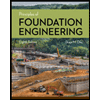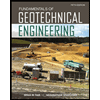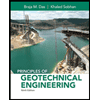5. A 40 m-long precast concrete pile with a diameter of 0.3 m is driven into a thick, dry sand layer. The unit weight of the sand is 16.8 kN/m³. The sand is cohesionless and has an effective friction angle of 35°. Estimate the ultimate bearing capacity by using Meyerhof's method for both the point bearing resistance, Qp, and the side resistance Qs (K 1.3 and 8' ≈ 0.8 6'). = 9a(net)-YDf Meyerhof's general bearing capacity equation: qu=c'NcFcs FcaFci+qNqFqsFqaFqi + 0.5yBNyFysFyaFyi Equations and Tables Bearing capacity of mat foundations for saturated clays with p = 0 1952) (1+0.4 1/4)+ qu = 5.14c (1+0.195 +9 1952) (1+0.40/4) qu(net) = qu− q = 5.14c (1+0.195! qu(net) FS = qu(net) Pile: Meyerhof's method Qp = Apqp = Apq'N₁₁ ≤ Apql q₁ = 0.5pa Natano' where pa = atmospheric pressure = 100 kPa The critical depth for skin friction in piles: L'≈ 15D The unit frictional resistance or the unit skin friction: f = Ko'。tand' TABLE 12.6 Interpolated Values of N Based on Meyerhof's Theory TABLE 12.10 Variation of A with Pile Embedment Length, L TABLE 12.11 Variation of a (Interpo- lated Values Based on Terzaghi et al., 1996) Embedment length, L (m) λ C Pa α 0 0.5 ≤0.1 1.00 5 0.336 0.2 0.92 10 0.245 0.3 0.82 15 0.200 0.4 0.74 20 0.173 0.6 0.62 Shape factors by De Beer (1970) Depth factors by Hansen (1970) Df/B≤1 Inclination factors by Meyerhof (1963) & Hanna and Meyerhof (1981) 2 Fcs = 1 + 1+ (-) (~) Fqs = 1 + B Fcd=Fqd 1-Fqd No tan o' +(²) tan o' Fqd = 1 + 2 tan ø′ (1 − sin ')2 Df | Fci = Fqi = (1 Fyi = (1-59)² 1- B° 90° 2 B Fys = 1-0.4 - 0.4 (+) Fyd = 1 Bo Inclination of the load on the foundation with respect to the vertical in degrees Table of bearing capacity factors Nc, Na, Ny for Meyerhof's general bearing capacity equation based on Prandtl (1921), Reissner (1924), Caquot & Kerisel (1953) and Vesic (1973): φ' (°) Nc Na Ny φ' (°) Nc Na Ny 0 5.14 1.00 0.00 1 5.38 1.09 0.07 2345 5.63 1.20 0.15 5.90 1.31 0.24 4 6.19 1.43 0.34 5 6.49 1.57 0.45 11 12 6789012 6 6.81 1.72 0.57 7.16 1.88 0.71 7.53 2.06 0.86 7.92 2.25 1.03 10 8.34 2.47 1.22 8.80 2.71 1.44 9.28 2.97 1.69 13 9.81 3.26 1.97 14 15 45 10.37 3.59 2.29 10.98 3.94 2.65 16 11.63 4.34 3.06 17 12.34 4.77 3.53 18 13.10 5.26 4.07 2222222222231030 15.81 7.07 6.20 16.88 7.82 7.13 18.05 8.66 8.20 24 19.32 9.60 9.44 25 20.72 10.66 10.88 26 22.25 11.85 12.54 27 23.94 13.20 14.47 28 25.80 14.72 16.72 22222222222-23736233 Soil friction angle, ' (deg) 20 21 N₁₂ 25 0.150 0.8 0.54 12.4 30 0.136 1.0 0.48 13.8 35 0.132 1.2 0.42 15.5 40 0.127 1.4 0.40 17.9 50 0.118 24 21.4 1.6 0.38 60 0.113 25 26.0 1.8 0.36 70 0.110 29.5 2.0 0.35 80 0.110 34.0 90 0.110 28 39.7 2.4 2.8 0.34 0.34 29 46.5 Note: Pa = atmospheric pressure 30 56.7 ≈ 100 kN/m² 31 68.2 Coyle and Castello (1981): 81.0 Qp = q'NgAp 96.0 Qs = (Ko' tan 8')PL where 8' = 0.8 ' 34 115.0 35 143.0 168.0 194.0 38 231.0 10 39 276.0 29 27.86 16.44 19.34 40 346.0 20 30.14 18.40 22.40 32.67 20.63 41 420.0 25.99 35.49 23.18 30.21 42 525.0 38.64 26.09 35.19 43 650.0 34 42.16 29.44 41.06 35 46.12 33.30 48.03 44 780.0 36 50.59 37.75 56.31 45 930.0 37 55.63 42.92 66.19 Embedment ratio, L/D T T 20 10 0+ Bearing capacity factor, N 20 40 60 80 100 200 Earth pressure coefficient, K 0.15 0.2 1.0 2 5 0 L 6' = 30° 31° 32° 33° 35° 34° 5 10 40 Embedment ratio, L/D 20 5 36° 20 25 50 38 61.35 48.93 78.02 32° 36° 19 13.93 5.80 4.68 39 67.87 55.96 92.25 20 14.83 6.40 5.39 75.31 64.20 109.41 For saturated clay: Q₁ = Apqp = ApCu N ' = 30° 40° No 9 for = = 0 60 60 T 38° 30- 34° For a method: fav = αcu For method: fλ(σo + 2cu) 70 35 36
5. A 40 m-long precast concrete pile with a diameter of 0.3 m is driven into a thick, dry sand layer. The unit weight of the sand is 16.8 kN/m³. The sand is cohesionless and has an effective friction angle of 35°. Estimate the ultimate bearing capacity by using Meyerhof's method for both the point bearing resistance, Qp, and the side resistance Qs (K 1.3 and 8' ≈ 0.8 6'). = 9a(net)-YDf Meyerhof's general bearing capacity equation: qu=c'NcFcs FcaFci+qNqFqsFqaFqi + 0.5yBNyFysFyaFyi Equations and Tables Bearing capacity of mat foundations for saturated clays with p = 0 1952) (1+0.4 1/4)+ qu = 5.14c (1+0.195 +9 1952) (1+0.40/4) qu(net) = qu− q = 5.14c (1+0.195! qu(net) FS = qu(net) Pile: Meyerhof's method Qp = Apqp = Apq'N₁₁ ≤ Apql q₁ = 0.5pa Natano' where pa = atmospheric pressure = 100 kPa The critical depth for skin friction in piles: L'≈ 15D The unit frictional resistance or the unit skin friction: f = Ko'。tand' TABLE 12.6 Interpolated Values of N Based on Meyerhof's Theory TABLE 12.10 Variation of A with Pile Embedment Length, L TABLE 12.11 Variation of a (Interpo- lated Values Based on Terzaghi et al., 1996) Embedment length, L (m) λ C Pa α 0 0.5 ≤0.1 1.00 5 0.336 0.2 0.92 10 0.245 0.3 0.82 15 0.200 0.4 0.74 20 0.173 0.6 0.62 Shape factors by De Beer (1970) Depth factors by Hansen (1970) Df/B≤1 Inclination factors by Meyerhof (1963) & Hanna and Meyerhof (1981) 2 Fcs = 1 + 1+ (-) (~) Fqs = 1 + B Fcd=Fqd 1-Fqd No tan o' +(²) tan o' Fqd = 1 + 2 tan ø′ (1 − sin ')2 Df | Fci = Fqi = (1 Fyi = (1-59)² 1- B° 90° 2 B Fys = 1-0.4 - 0.4 (+) Fyd = 1 Bo Inclination of the load on the foundation with respect to the vertical in degrees Table of bearing capacity factors Nc, Na, Ny for Meyerhof's general bearing capacity equation based on Prandtl (1921), Reissner (1924), Caquot & Kerisel (1953) and Vesic (1973): φ' (°) Nc Na Ny φ' (°) Nc Na Ny 0 5.14 1.00 0.00 1 5.38 1.09 0.07 2345 5.63 1.20 0.15 5.90 1.31 0.24 4 6.19 1.43 0.34 5 6.49 1.57 0.45 11 12 6789012 6 6.81 1.72 0.57 7.16 1.88 0.71 7.53 2.06 0.86 7.92 2.25 1.03 10 8.34 2.47 1.22 8.80 2.71 1.44 9.28 2.97 1.69 13 9.81 3.26 1.97 14 15 45 10.37 3.59 2.29 10.98 3.94 2.65 16 11.63 4.34 3.06 17 12.34 4.77 3.53 18 13.10 5.26 4.07 2222222222231030 15.81 7.07 6.20 16.88 7.82 7.13 18.05 8.66 8.20 24 19.32 9.60 9.44 25 20.72 10.66 10.88 26 22.25 11.85 12.54 27 23.94 13.20 14.47 28 25.80 14.72 16.72 22222222222-23736233 Soil friction angle, ' (deg) 20 21 N₁₂ 25 0.150 0.8 0.54 12.4 30 0.136 1.0 0.48 13.8 35 0.132 1.2 0.42 15.5 40 0.127 1.4 0.40 17.9 50 0.118 24 21.4 1.6 0.38 60 0.113 25 26.0 1.8 0.36 70 0.110 29.5 2.0 0.35 80 0.110 34.0 90 0.110 28 39.7 2.4 2.8 0.34 0.34 29 46.5 Note: Pa = atmospheric pressure 30 56.7 ≈ 100 kN/m² 31 68.2 Coyle and Castello (1981): 81.0 Qp = q'NgAp 96.0 Qs = (Ko' tan 8')PL where 8' = 0.8 ' 34 115.0 35 143.0 168.0 194.0 38 231.0 10 39 276.0 29 27.86 16.44 19.34 40 346.0 20 30.14 18.40 22.40 32.67 20.63 41 420.0 25.99 35.49 23.18 30.21 42 525.0 38.64 26.09 35.19 43 650.0 34 42.16 29.44 41.06 35 46.12 33.30 48.03 44 780.0 36 50.59 37.75 56.31 45 930.0 37 55.63 42.92 66.19 Embedment ratio, L/D T T 20 10 0+ Bearing capacity factor, N 20 40 60 80 100 200 Earth pressure coefficient, K 0.15 0.2 1.0 2 5 0 L 6' = 30° 31° 32° 33° 35° 34° 5 10 40 Embedment ratio, L/D 20 5 36° 20 25 50 38 61.35 48.93 78.02 32° 36° 19 13.93 5.80 4.68 39 67.87 55.96 92.25 20 14.83 6.40 5.39 75.31 64.20 109.41 For saturated clay: Q₁ = Apqp = ApCu N ' = 30° 40° No 9 for = = 0 60 60 T 38° 30- 34° For a method: fav = αcu For method: fλ(σo + 2cu) 70 35 36
Principles of Foundation Engineering (MindTap Course List)
9th Edition
ISBN:9781337705028
Author:Braja M. Das, Nagaratnam Sivakugan
Publisher:Braja M. Das, Nagaratnam Sivakugan
Chapter18: Sheet-pile Walls
Section: Chapter Questions
Problem 18.2P
Related questions
Question
I need detailed explanation solving this exercise from Foundation Engineering, step by step please.

Transcribed Image Text:5. A 40 m-long precast concrete pile with a diameter of 0.3 m is driven into a thick, dry sand layer. The unit weight of
the sand is 16.8 kN/m³. The sand is cohesionless and has an effective friction angle of 35°. Estimate the ultimate
bearing capacity by using Meyerhof's method for both the point bearing resistance, Qp, and the side resistance Qs
(K 1.3 and 8' ≈ 0.8 6').
=
9a(net)-YDf
Meyerhof's general bearing capacity equation:
qu=c'NcFcs FcaFci+qNqFqsFqaFqi + 0.5yBNyFysFyaFyi
Equations and Tables
Bearing capacity of mat foundations for saturated clays with p = 0
1952) (1+0.4 1/4)+
qu =
5.14c (1+0.195
+9
1952) (1+0.40/4)
qu(net) = qu− q = 5.14c (1+0.195!
qu(net)
FS =
qu(net)
Pile: Meyerhof's method
Qp = Apqp = Apq'N₁₁ ≤ Apql
q₁ = 0.5pa Natano' where pa = atmospheric pressure = 100 kPa
The critical depth for skin friction in piles: L'≈ 15D
The unit frictional resistance or the unit skin friction: f = Ko'。tand'
TABLE 12.6 Interpolated Values of N Based on
Meyerhof's Theory
TABLE 12.10 Variation of A with Pile
Embedment Length, L
TABLE 12.11 Variation of a (Interpo-
lated Values Based on
Terzaghi et al., 1996)
Embedment
length, L (m)
λ
C
Pa
α
0
0.5
≤0.1
1.00
5
0.336
0.2
0.92
10
0.245
0.3
0.82
15
0.200
0.4
0.74
20
0.173
0.6
0.62
Shape factors by De
Beer (1970)
Depth factors by Hansen (1970)
Df/B≤1
Inclination factors by Meyerhof
(1963) & Hanna and Meyerhof (1981)
2
Fcs = 1 +
1+ (-) (~)
Fqs = 1 +
B
Fcd=Fqd
1-Fqd
No tan o'
+(²) tan
o'
Fqd = 1 + 2 tan ø′ (1 − sin ')2 Df
| Fci = Fqi = (1
Fyi = (1-59)²
1-
B°
90°
2
B
Fys
= 1-0.4
- 0.4 (+)
Fyd
= 1
Bo Inclination of the load on the
foundation with respect to the vertical
in degrees
Table of bearing capacity factors Nc, Na, Ny for Meyerhof's general bearing capacity equation based on Prandtl
(1921), Reissner (1924), Caquot & Kerisel (1953) and Vesic (1973):
φ' (°)
Nc
Na
Ny
φ' (°)
Nc
Na
Ny
0
5.14
1.00
0.00
1
5.38
1.09
0.07
2345
5.63
1.20
0.15
5.90
1.31
0.24
4
6.19
1.43
0.34
5
6.49
1.57
0.45
11
12
6789012
6
6.81
1.72
0.57
7.16
1.88
0.71
7.53
2.06
0.86
7.92
2.25
1.03
10
8.34
2.47
1.22
8.80
2.71
1.44
9.28
2.97
1.69
13
9.81
3.26
1.97
14
15
45
10.37
3.59
2.29
10.98
3.94
2.65
16
11.63
4.34
3.06
17
12.34
4.77
3.53
18
13.10
5.26
4.07
2222222222231030
15.81
7.07
6.20
16.88
7.82
7.13
18.05
8.66
8.20
24
19.32
9.60
9.44
25
20.72
10.66
10.88
26
22.25
11.85
12.54
27
23.94
13.20
14.47
28
25.80
14.72
16.72
22222222222-23736233
Soil friction angle, ' (deg)
20
21
N₁₂
25
0.150
0.8
0.54
12.4
30
0.136
1.0
0.48
13.8
35
0.132
1.2
0.42
15.5
40
0.127
1.4
0.40
17.9
50
0.118
24
21.4
1.6
0.38
60
0.113
25
26.0
1.8
0.36
70
0.110
29.5
2.0
0.35
80
0.110
34.0
90
0.110
28
39.7
2.4
2.8
0.34
0.34
29
46.5
Note: Pa =
atmospheric pressure
30
56.7
≈ 100 kN/m²
31
68.2
Coyle and Castello (1981):
81.0
Qp = q'NgAp
96.0
Qs
=
(Ko' tan 8')PL where 8' = 0.8 '
34
115.0
35
143.0
168.0
194.0
38
231.0
10
39
276.0
29
27.86
16.44
19.34
40
346.0
20
30.14
18.40
22.40
32.67
20.63
41
420.0
25.99
35.49
23.18
30.21
42
525.0
38.64
26.09
35.19
43
650.0
34
42.16
29.44
41.06
35
46.12
33.30
48.03
44
780.0
36
50.59
37.75
56.31
45
930.0
37
55.63
42.92
66.19
Embedment ratio, L/D
T
T
20
10
0+
Bearing capacity factor, N
20 40 60 80 100
200
Earth pressure coefficient, K
0.15 0.2
1.0
2
5
0
L
6' =
30°
31°
32°
33°
35°
34°
5
10
40
Embedment ratio, L/D
20
5
36°
20
25
50
38
61.35
48.93
78.02
32° 36°
19
13.93
5.80
4.68
39
67.87
55.96
92.25
20
14.83
6.40
5.39
75.31
64.20
109.41
For saturated clay: Q₁ = Apqp = ApCu N
' = 30°
40°
No 9 for =
= 0
60
60
T
38°
30-
34°
For a method: fav = αcu
For method: fλ(σo + 2cu)
70
35
36
Expert Solution
This question has been solved!
Explore an expertly crafted, step-by-step solution for a thorough understanding of key concepts.
Step by step
Solved in 2 steps with 4 images

Recommended textbooks for you

Principles of Foundation Engineering (MindTap Cou…
Civil Engineering
ISBN:
9781337705028
Author:
Braja M. Das, Nagaratnam Sivakugan
Publisher:
Cengage Learning

Principles of Foundation Engineering (MindTap Cou…
Civil Engineering
ISBN:
9781305081550
Author:
Braja M. Das
Publisher:
Cengage Learning

Fundamentals of Geotechnical Engineering (MindTap…
Civil Engineering
ISBN:
9781305635180
Author:
Braja M. Das, Nagaratnam Sivakugan
Publisher:
Cengage Learning

Principles of Foundation Engineering (MindTap Cou…
Civil Engineering
ISBN:
9781337705028
Author:
Braja M. Das, Nagaratnam Sivakugan
Publisher:
Cengage Learning

Principles of Foundation Engineering (MindTap Cou…
Civil Engineering
ISBN:
9781305081550
Author:
Braja M. Das
Publisher:
Cengage Learning

Fundamentals of Geotechnical Engineering (MindTap…
Civil Engineering
ISBN:
9781305635180
Author:
Braja M. Das, Nagaratnam Sivakugan
Publisher:
Cengage Learning

Principles of Geotechnical Engineering (MindTap C…
Civil Engineering
ISBN:
9781305970939
Author:
Braja M. Das, Khaled Sobhan
Publisher:
Cengage Learning